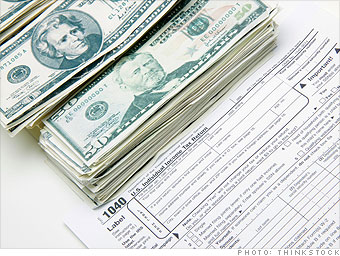The Democrats: "This election will have a major impact on tax policy," says Mark Zandi of Moody's Analytics.
Obama's new budget was pending in early February, but his September proposal to the Congressional deficit Super Committee shows his priorities: He would
raise taxes on couples earning above $250,000, with the top brackets rising from today's 33% and 35% up to 36% and 39.6%. Those filers would also see their dividend and capital gains rate go from 15% to 20%. More recently Obama has shifted his rhetorical focus to millionaires. A
Buffett Rule would have people earning above $1 million pay a tax of at least 30%.
The Republicans: The contrast to Obama couldn't be starker. The Republican candidates promise at the very least to extend all the Bush-era tax cuts set to expire in 2013; Gingrich and
Rick Santorum offer the biggest cuts, with
Gingrich effectively lowering the top rate to 15%.
Republicans also want to dramatically reduce the tax burden on investment.
Romney would eliminate all taxes on capital gains and dividends for individuals earning less than $100,000 and on couples earning less than $200,000. Gingrich says he would eliminate those taxes entirely.
Under any Republican, corporate taxes would also be in line for cuts.
Where you stand: The idea of handing over more money to Uncle Sam isn't a deal breaker for most MONEY readers.
The majority are willing to at least consider a candidate who would raise their taxes. But there's not a strong interest in soaking the rich: Half of MONEY readers think rates should stay where they are -- for wealthy, middle-class, and low-income payers alike.
NEXT: Federal deficit


